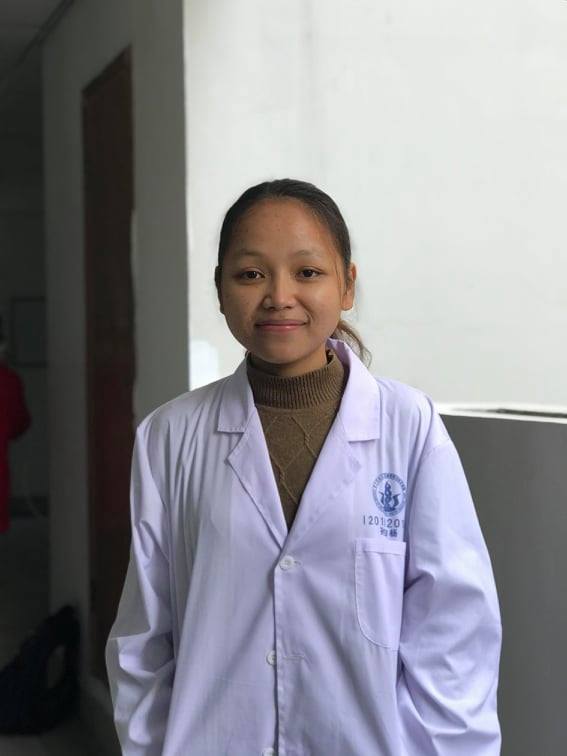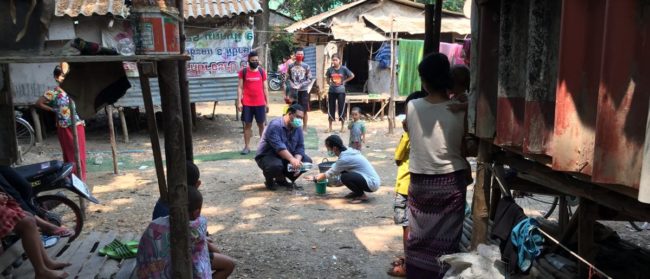Prior to the Covid-19 outbreak, Soun Phannaroat was part of a cohort of approximately 2,500 Cambodian students studying in the Chinese cities of Beijing, Tianjin and Wuhan. At the time of the outbreak in late-December, Soun was studying medicine in Wuhan, Hubei province. While the Globe takes the utmost care to publish accurate information, by the nature of these personal essays we are unable to independently verify the information contained within them.
Before the outbreak of the novel coronavirus (later to become known as Covid-19) in December 2019, life in Wuhan was ticking along normally. There were many people in public spaces, hospitals, markets and restaurants. I had lived in Wuhan for a year and a half under a scholarship programme, majoring in medical science in Huazhong University of Science and Technology.
I first received Covid-19 news in late December at the start of the outbreak. At first, I wasn’t particularly worried as only four or five people were reported to be infected. The local authorities had advised the residents of Wuhan to take precautions by wearing masks in order to prevent the spread, even before we realised human-to-human transmission was possible.
We were told that patient zero was thought to have become infected from a live animal in a fish market in Wuhan. Since I did not completely understand what the virus was, I did not pay much attention to the issue at first.
I’m not certain when I first heard that human-to-human transmission had occurred; yet, on January 19 and 20 I heard over 70 people contracted the virus. January is a nationwide holiday for all students in China, and for us students it meant the majority of us were going to travel home. Normally during the vacation I would have flown back home to Cambodia, however, I was occupied with a practicum in a hospital in Wuhan.
As soon as I received information about Covid-19, I was terrified because of my day-to-day interactions with patients in the hospital. Yet, I decided to stay in Wuhan working in the hospital as the situation remained calm and businesses had not yet been shut down. At the hospital, the rules were very strict, all doctors had to wear proper masks and wash their hands regularly.
As the spread became severe on January 21, there were reported cases of death from the virus resulting in orders to shut down some crowded places. I became absolutely petrified, and then my professor stopped me from going to work at the hospital.
The airport remained open and I was anxious about making a decision whether to return to Cambodia. If I have the virus, I might spread it to my family and other people, but if I stay here, my life will be very difficult as supermarkets and restaurants were shuttered, and I had to stay in my dorm room all day every day. I thought to myself: “There’s no food here in the room to eat, if I don’t go out and risk coming close to the virus, I can’t eat.”
Eventually, I decided to return to Cambodia and purchased a flight ticket for January 23 at 8am, which was a day the government made an announcement to lock down the city and halt all scheduled flights departing at 10am, only two hours after my flight was scheduled to leave.

Although I was not in Wuhan during the lockdown, my friends who were stranded there told me that all students were not allowed to leave their place if not necessary and permitted. As time went on, the lockdown became more and more strict. In the first week or two, people could go out to buy vegetables, or other goods, and supermarkets were open. Then, with more and more serious cases of the virus, it was instructed that the elderly should stay indoors and not go out at all. Then, almost all people were not allowed to leave home, apart from doctors, nurses and some workers with a pass.
Three daily meals were sent to my student friends’ front doors, and they needed to report to staff about their health condition every day. They also told me that the Cambodian government supported Cambodian students who were in Wuhan with $500 per month during the lockdown.
I was very cautious when I travelled back to Cambodia. I took a taxi at 5am to the airport in Wuhan in order to avoid the crowds, wore thick clothes and masks, changed every four hours, washed my hands once I touched surfaces and kept a two-metre distance from people.
These were then known to be the prevention measures, which were not easy to conduct as the airport was full of people. However, the airport staff conducted meticulous temperature checks of all passengers, halting those who exceeded normal body temperature for further check up. I fortunately had a normal body temperature then; hence, I could come on board.
My parents were happy I returned, but they were not worried about the disease as they didn’t know about it. Even when I told them to stay away from me for 14 days to avoid infection, they didn’t believe me about the risks
Though I did not have a fever on the day I left Wuhan, it did not guarantee that I did not contract the virus as the symptoms appeared within 14 days after the incubation; so I had to self quarantine for the next 14 days back home in Cambodia. My parents were happy I returned, but they were not worried about the disease as they didn’t know about it. Even when I told them to stay away from me for 14 days to avoid infection, they didn’t believe me about the risks.
A few days following my return, I would be constantly checking the news on my phone for 13 hours a day and collecting information on the coronavirus due to the high number of infected patients and the lack of beds in Wuhan. I also became terrified and anxious as I was afraid that I might have contracted the virus and spreaded to my family and surrounding people.
During the isolation, I found myself slipping into a depression as I had to stay in a room alone away from my family so I decided to exercise and read books I’d never got round to starting in order to distract myself. Additionally, I constantly measured my temperature and checked my health condition every day. Reading, listening to music, exercising and watching TV programmes became my daily routine, which helped me focus and distract my thoughts. After the 14-day-quarantine, I felt relieved not to show any symptoms.
The lockdown period was continued longer than anticipated in China, and I think that most people weren’t prepared for it. At first, we thought it was a week, then a fortnight, then it was a month, and now it has been two months.
For me, having a daily routine was very important when I was in lockdown, as was keeping up with regular activities. Reading is the simplest, then practicing a musical instrument: engaging in artistic activities can really make you feel better.
This story is part of the Globe’s Tales of the Pandemic series, a collection of personal essays from across Southeast Asia called published each Monday covering different aspects of life during this unprecedented time in human history. All of these Covid-19 stories can be found here. If you’d like to contribute a personal essay of your own, please email your story of roughly 1,000 words to a.mccready@globemediaasia.com.


